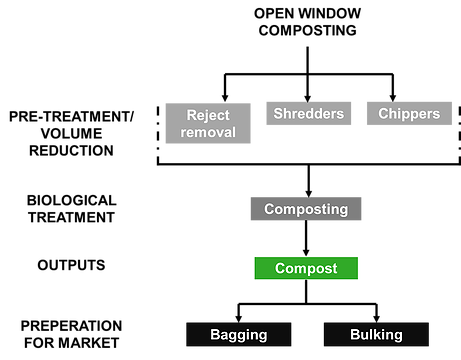Composting takes place in the open air in large, elongated, uniform prism shaped ‘piles’ of waste known as windrows. The waste feedstock is mechanically shredded and placed into long windrows on a solid, non-permeable surface. Water may be added, depending on the moisture content of the waste.
The windrows are turned regularly, either with a wheeled loader or by a specialist windrow turner machine (pulled along by a tractor / dedicated vehicle). The windrows are turned several times during the compost process, which takes in the region of twelve to sixteen weeks.

Configuration
Technology restrictions
- OWC is a process that can take up to 12 weeks
- The technology requires mechanical treatment to remove contaminants
- Compost turned by mechanical means should not be practised in close proximity to settlements in case of odour / bio aerosol issues
Main license requirements for open windrow composting
Advantages:
- Open windrow composting is a relatively low capital waste treatment process
- Saleable product
- Land application when convenient
- Improves nutrient qualities
Disadvantages:
- Green waste dependent on the weather conditions
- Collection infrastructure impacts waste types received
- There can be respiratory / health issues associated with bio aerosols from turning compost, and some odour issues
- High use of water
Composting of Municipal Waste in Cape Town, South Africa
With a population of about 3 million, Cape Town is one of the three largest cities in South Africa. It is a commercial and industrial centre with both process and manufacturing industries. The average living standard is high and the rate of unemployment low compared to other areas in the country. In the area around Cape Town the agricultural sector is well developed and has considerable export of fruit. International demands for organic products have given rise to an awareness of advantages in using compost and a hands-on-knowledge about how to produce it in the agricultural sector. It has also stimulated research in the field at the universities. The Cape Peninsula has a Mediterranean climate with mild winters with an average minimum temperature of around 7°C, and hot and dry summers. Most of the city's annual rainfall occurs in wintertime, but due to the mountainous topography of the city, rainfall amounts for specific areas can vary dramatically. The valleys and coastal plains average 500 millimetres of rain per annum, while mountain areas can average as much as 1500 millimetres per annum. The Peninsula gets frequent strong winds from the south-east.97 The warm climate is favourable for composting all year round, but the hot and windy summer weather put high demands on water supply for the compost.
